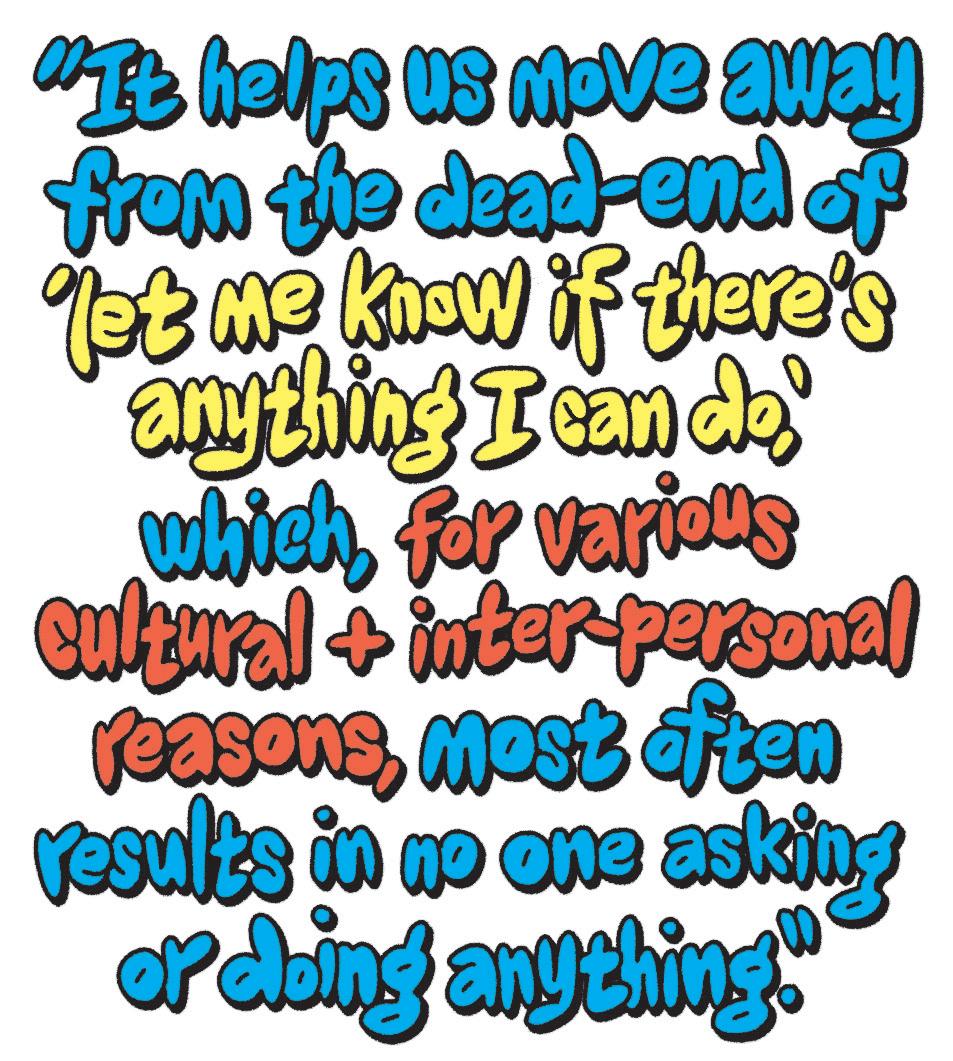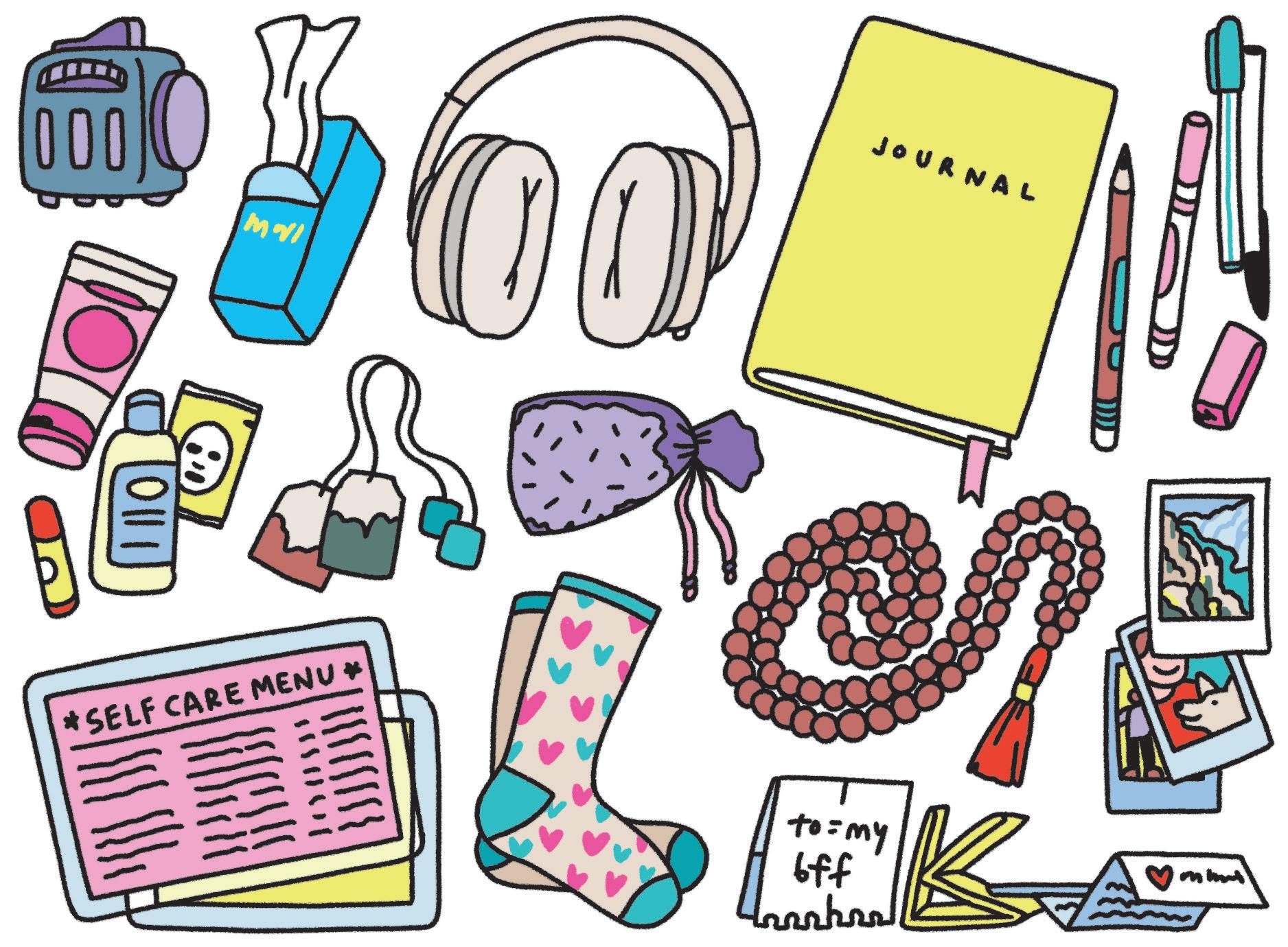
4 minute read
Using A Tough Times Guide To Create A Culture Of Care In Your Inner Circle How To Make Your Own Self-Care Kit
Sometimes, when someone we love needs support, we don’t realize it until it’s nearly impossible for them to reach out and ask for help. Sometimes, asking for help becomes a challenging task in itself because the people closest to us don’t know what we need. Sometimes — like the past couple of years — it seems as if everyone needs help, and it’s hard to know how much we have to give each other.
A recurring theme in Anne Helen Peteron’s Substack blog Culture Study is how to cultivate community and care for one another. She sums up why it’s so hard to ask for help: Our society makes it difficult to develop real networks of care.
Whether through inadequate housing, social safety nets, or otherwise, many of us have been taught that individualism is at the heart of identity, and lots of us have internalized trauma (errr, masculinity) that makes seeking support even more difficult.
But Peterson also explores one straightforward way we can communicate our care needs: A Tough Times Guide. A Tough Times Guide is essentially a user manual on how your people can best support you. Peterson, with the help of her readers, created a Google form that folks can adapt to their liking to create a guide of their own.
“A form might seem clinical, but I find that it allows people to answer honestly in a way they might not if, say, you were asking them these questions in person,” Peterson writes. “It also helps us move away from the dead-end of ‘let me know if there’s anything I can do,’ which, for various cultural and inter-personal reasons, most often results in no one asking or doing anything.”
All of us wish we had our very own magical Mary Poppins bag to summon any item we might need at a moment’s notice. Since that goes a bit above and beyond what most of us are capable of, we’ve got the next best thing: A self-care kit.
Self-care kits are pre-curated collections of items you can turn to during a difficult mental health period. These are typically items that help you feel grounded, relaxed, and relieved — but these kits can be anything that fits your unique needs. While they are obviously not a substitute for other methods of mental health support, self-care kits take the guesswork out of situations that can be hard to read (uh, a dissociative panic attack, anyone?) and give you tools to cope with difficult experiences with very little thinking and planning on your part.
And isn’t that the hardest part of taking care of yourself? Planning and executing the smallest tasks that seem way too complicated? This is a way for Current You to take care of Future You with all the tools you might need.
Although each person’s self-care kit will be totally unique to the person creating it, here are some examples of what you can include in yours to get you started.
The form includes prompts like how people best like to communicate, what kinds of foods make them feel loved and nourished, stuff that would be really helpful (even though they’d probably never ask for it), and affirmations and reminders that are really valuable to them.
Folks can use these prompts to create their own forms and send them to a partner, friend group, or family; or they can be an inspiration to just create an individual guide to distribute to loved ones. It might feel a little formal at first, but at the end of the day, a Tough Times Guide is a great tool to mitigate those barriers to care in your inner circle.
As Peterson writes: “Is this form going to create an instant and miraculous community of care? Of course not. But it is going to make the work of creating it just a little bit easier.”
Learn more: annehelen.substack.com/p/a-shortcut-for-caring-for-others
1 Your meds, if you take any 2 Fidget toys or sensory items 3 Tissues 4 Headphones (and a grounding playlist, guided meditation, or podcast you can turn to) 5 Journal, notebook, or art supplies 6 Some travel-size hygiene supplies that make you feel good (throw a fun sheet mask in there for good measure!) 7 Candy that helps you reset your nervous system (sour candies and ginger chews are great for this) 8 A few bags of calming tea (or a couple of packets of hot cocoa) 9 A sachet of dried lavender 10 Affirmation cards 11 Meditation beads or a meditation pillow 12 Photos of happy memories, locations, or loved ones (or your dog) 13 A notepad to write a gratitude list 14 A “menu” of self-care information including contact info for your support system, a list of grounding activities, or ideas for things to do depending on your energy level 15 Cozy socks or slippers (or even a whole comfy outfit) 16 A collection of encouraging notes from loved ones

I am grateful for…
I will accept…
I will celebrate …
One of the most accessible daily mental health interventions we have at our disposal is journaling (ugh, we know you’ve probably heard that one too many times!). But while we might not feel like we have the time, motivation, or energy to put pen to paper, study after study shows that this practice (even for just two minutes) can have a lasting impact on our well-being.
Inspired by bestselling author Neil Pasricha’s “Two Minute Mornings: A Journal to Win Your Day Every Day,” we hope this page serves as a way for you to take two minutes (seriously, only two minutes) out of your day to connect with yourself and the world around you.
I am grateful for…
I will learn from…
I will create…
I am grateful for…
I am grateful for…
I am grateful for…
I will trust…
I will forgive…
I will care for…
I will savor…
I will advocate for…
I will notice…
I am grateful for….
I will love …
I will honor…
I am grateful for….
I will make peace with…
I will seek…






